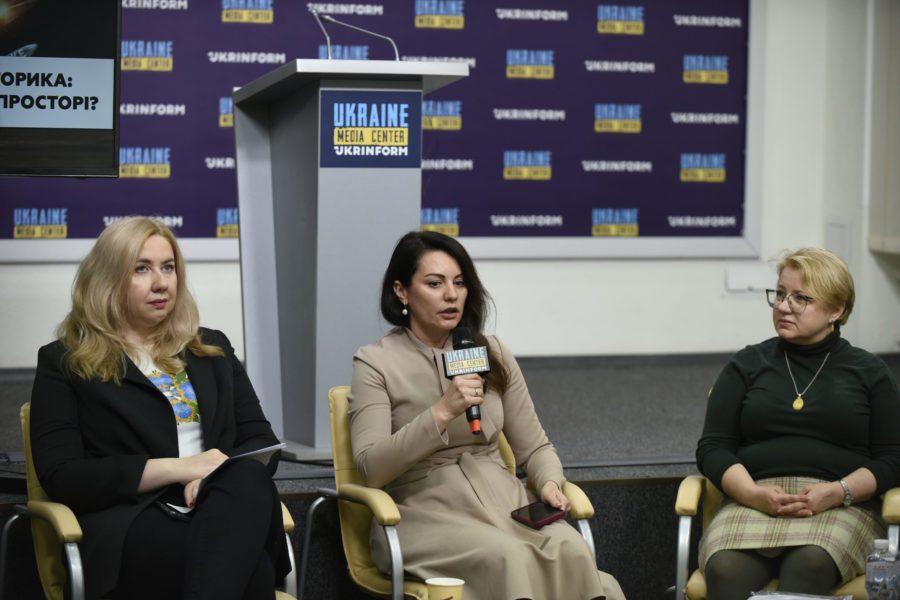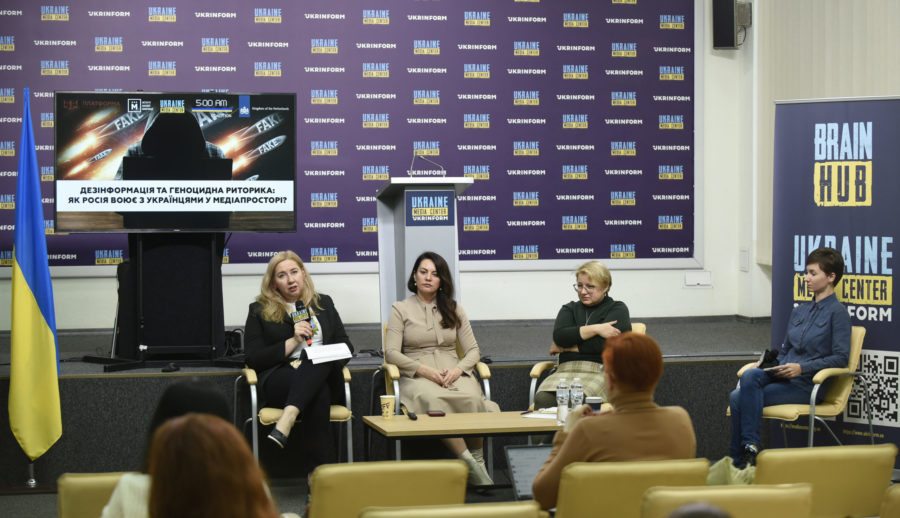Russia’s disinformation about Ukraine nearly doubled this year
The number of Russian propaganda narratives circulating in the information space is increasing compared to last year. Some of them have signs of genocidal rhetoric, while others aim to undermine the trust of partner countries and discredit Ukrainians.

Participants in the press conference “Disinformation and genocidal rhetoric: How does Russia fight with Ukrainians in the media space?” discussed how evidence against Russian propagandists is collected, what awaits them in the future, and what social rifts are targeted by hostile information attacks. The event organized by Ukraine 5AM Coalition was held at the Media Center Ukraine–Ukrinform on November 1, 2023.
Today, twice as many disinformation messages from the Russian Federation are recorded in the information spaces compared to last year. As Human Rights Platform reported, experts recorded 742 such messages between February and December 2022, while 1,452 such messages were recorded between January and August 2023. The monitoring data also showed that about 40% of Russian news content is dedicated to Ukraine. Messages that discredited the Ukrainian authorities and the Armed Forces of Ukraine, as well as messages about “Nazi Ukrainians”, were spread most actively.
“Such disinformation messages contain elements of genocidal rhetoric. After all, they quite often contain calls to exterminate Ukrainians because, according to the Russians, we are Nazis, and, therefore, parallels are drawn with Nazi Germany. Regarding the punishment for such appeals, the Criminal Code of Ukraine has Article 442 which provides for liability for the dissemination of such information.
However, as of today, the Register of Court Decisions contains only one verdict under this article – it is a verdict dated March of this year,” noted Human Rights Platform lawyer Olha Vdovenko.
According to the expert, if we talk about holding Russia accountable for the spread of such rhetoric, the collection, generalization, systematization and documentation of information are extremely important. According to the Convention on the Prevention and Punishment of the Crime of Genocide, it is possible to collect evidence and submit it to the UN International Court of Justice as additional evidence to hold Russia accountable for spreading genocidal rhetoric. Director of the Institute of Mass Information Oksana Romaniuk adds that, for example, the rhetoric of Russian aggressive propaganda in terms of direct calls for the destruction of Ukrainian infrastructure can be considered a component of the crime of genocide.
“We have two tasks before us. The first is to show the systematic nature of this crime. These are not individual messages of individual journalists. This is a precisely targeted, Kremlin-funded part of the war. We are interested to see the moment when it started. The second point is the result of these calls in real life. We can see the effect of information influence in polls of Russians who actively support the war in Ukraine. Or when Russian prisoners are asked why they came here, they quote Skabeyeva and Solovyov and say that they came ‘to save people from the Nazis.’ We saw this result in the inscriptions, for example, in the liberated Bucha district. There, Russians left many different marks on the walls, where they wrote that Ukrainians were ‘Nazis’, ‘rats’, etc.,” Romaniuk said.

Lidiya Chorna, social psychologist at the Institute of Social and Political Psychology of the National Academy of Educational Sciences of Ukraine, spoke about several stages of Russian propaganda. One of them is the victimization of the population.
“In the Russian press, as at the level of kindergarten and at the level of children’s teams, uniforms are worn, various performances are played out, as a result of which children identify themselves with victims of violence. It has all kinds of propaganda, and it all ends with genocidal rhetoric about ‘revenge’ of the group in which the emotional sphere is agitated in this way. In addition, social psychologists consider war as an extreme, utmost, violent type of intergroup interaction. War is always about the polarization of the world into our own and strangers,” the psychologist added.
Currently, international legislation does not provide for a separate definition of the crime of spreading genocidal rhetoric or public calls for genocide, explained Volodymyr Zelenchuk, a lawyer at the Institute of Mass Information. The current version of the Rome Statute considers incitement to commit genocide as a separate way of committing this crime, and individual responsibility for such incitement rests with the people who commit it. Because of this, now the law does not provide an opportunity to hold Russia to account for developing, implementing and actively financing genocidal rhetoric.
“Therefore, we collect evidence of genocidal rhetoric and dissemination to use it as an evidence base as soon as the mechanism is determined, either within the International Criminal Court or within the special tribunal. Of course, this will happen if international judicial institutions and organizations come to the conclusion that it is necessary to create a mechanism of accountability not only for the crime of aggression but also for the crime of genocide,” the lawyer explained.
Watch the event at the link.
If you have found a spelling error, please, notify us by selecting that text and pressing Ctrl+Enter.















